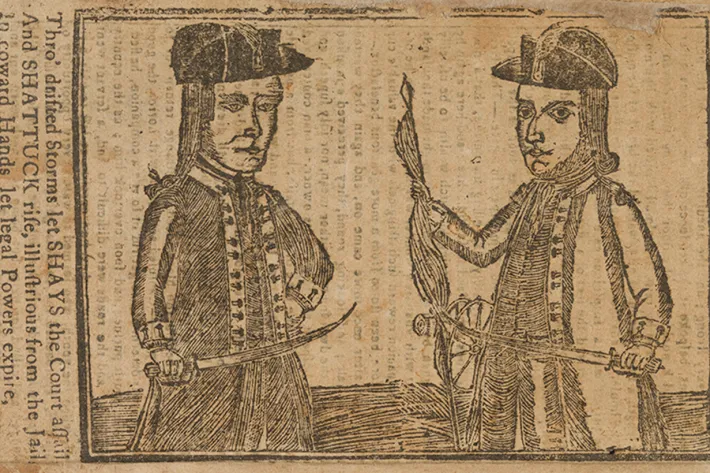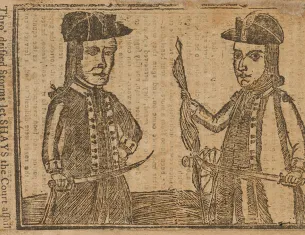A Farmer’s Grievances during Shays’ Rebellion, 1786

Daniel Shays and Job Shattuck, 1787, National Portrait Gallery, Smithsonian Institution
During Shays’ Rebellion, groups of so-called “Regulators” were successful in shutting down local courts throughout the state of Massachusetts. Daniel Gray was one of the leaders of the Regulators and the chairman of a committee of rebels. Gray wrote this statement of grievances to be printed in the local newspaper, the Hampshire Gazette. In his statement, Gray addresses some key causes of the rebellion, including the method of debt collection and the taxes imposed by the state to help pay off debt accumulated during the American Revolution.
An Address to the People by Daniel Gray of Pelham, December 7, 1786
Worcester December 7, 1786
An ADDRESS to the PEOPLE of the several Towns in the County of Hampshire, from the Body now at arms.
Gentlemen,
WE have thought proper to inform you of some of the principal causes of the late risings of the people, and also of their present movement, viz.
1st: The present expensive mode of collecting debts, which by the reason of the great scarcity of cash, will of necessity fill our gaols with unhappy debtors, and thereby render a reputable body of people incapable of being serviceable either to themselves or the community.
2d. The monies raised by impost and excise being appropriated to discharge the interest of governmental securities, and not the foreign debt, when these securities are not subject to taxation.
3d. A suspension of the Writ of Habeas Corpus, by which those persons who have stepped forth to assert and maintain the rights of the people, are liable to be taken, and conveyed even to the most distant part of the commonwealth, and thereby subject to an unjust punishment.
4th. The unlimited power granted to Justices of the Peace, Sheriffs, Deputy-Sheriffs and Constables, by the Riot Act, indemnifying them in the prosecution thereof, when perhaps wholly actuated from a principle of revenge, hatred and envy.
5th. [illegible] be assured, that this body now at arms, dispite the idea of being initiated by British emissaries, which is so strenuously propagated by the enemies of our liberties: We also with the most proper and speedy measures may be taken to discharge both our foreign and domestic debt.
Per Order,
DANIEL GRAY, Chairman of a Com. for the above purpose.
Source: “An Address to the People by Daniel Gray of Pelham,” Hampshire Gazette, December 27, 1786, Shays’ Rebellion, Springfield Technical Community College, shaysrebellion.stcc.edu
An Address to the People by Daniel Gray of Pelham, December 7, 1786
Worcester December 7, 1786
An ADDRESS to the PEOPLE of the several Towns in the County of Hampshire, from the Body now at arms.
Gentlemen,
WE have thought proper to inform you of some of the principal causes of the late risings of the people, and also of their present movement, viz.
1st: The present expensive mode of collecting debts, which by the reason of the great scarcity of cash, will of necessity fill our gaols with unhappy debtors, and thereby render a reputable body of people incapable of being serviceable either to themselves or the community.
2d. The monies raised by impost and excise being appropriated to discharge the interest of governmental securities, and not the foreign debt, when these securities are not subject to taxation.
3d. A suspension of the Writ of Habeas Corpus, by which those persons who have stepped forth to assert and maintain the rights of the people, are liable to be taken, and conveyed even to the most distant part of the commonwealth, and thereby subject to an unjust punishment.
4th. The unlimited power granted to Justices of the Peace, Seriffs, Deputy-Seriffs and Constables, by the Riot Act, indemnifying them in the prosecution thereof, when perhaps wholly actuated from a principle of revenge, hatred and envy.
5th. [illegible] be assured, that this body now at arms, dispite the idea of being initiated by British emissaries, which is to strenuously propagated by the enemies of our liberties: We also with the most proper and speedy measures may be taken to discharge both our foreign and domestic debt.
Per Order,
DANIEL GRAY, Chairman of a Com. for the above purpose.
Source: “An Address to the People by Daniel Gray of Pelham,” Hampshire Gazette, December 27, 1786, Shays’ Rebellion, Springfield Technical Community College, shaysrebellion.stcc.edu.
scarcity - short supply
appropriated - taken without permission
liable - legally able
indemnifying - compensating for harm or loss
actuated - motivated
emissaries - a person (usually a diplomatic representative) sent on a special mission
propagated - spread
Background
During Shays’ Rebellion, groups of so-called “Regulators” were successful in shutting down local courts throughout the state of Massachusetts. Daniel Gray was one of the leaders of the Regulators and the chairman of a committee of rebels. Gray wrote this statement of grievances to be printed in the local newspaper, the Hampshire Gazette. In his statement, Gray addresses some key causes of the rebellion, including the method of debt collection and the taxes imposed by the state to help pay off debt accumulated during the American Revolution.
Transcript
An Address to the People by Daniel Gray of Pelham, December 7, 1786
Worcester December 7, 1786
An ADDRESS to the PEOPLE of the several Towns in the County of Hampshire, from the Body now at arms.
Gentlemen,
WE have thought proper to inform you of some of the principal causes of the late risings of the people, and also of their present movement, viz.
1st: The present expensive mode of collecting debts, which by the reason of the great scarcity of cash, will of necessity fill our gaols with unhappy debtors, and thereby render a reputable body of people incapable of being serviceable either to themselves or the community.
2d. The monies raised by impost and excise being appropriated to discharge the interest of governmental securities, and not the foreign debt, when these securities are not subject to taxation.
3d. A suspension of the Writ of Habeas Corpus, by which those persons who have stepped forth to assert and maintain the rights of the people, are liable to be taken, and conveyed even to the most distant part of the commonwealth, and thereby subject to an unjust punishment.
4th. The unlimited power granted to Justices of the Peace, Sheriffs, Deputy-Sheriffs and Constables, by the Riot Act, indemnifying them in the prosecution thereof, when perhaps wholly actuated from a principle of revenge, hatred and envy.
5th. [illegible] be assured, that this body now at arms, dispite the idea of being initiated by British emissaries, which is so strenuously propagated by the enemies of our liberties: We also with the most proper and speedy measures may be taken to discharge both our foreign and domestic debt.
Per Order,
DANIEL GRAY, Chairman of a Com. for the above purpose.
Source: “An Address to the People by Daniel Gray of Pelham,” Hampshire Gazette, December 27, 1786, Shays’ Rebellion, Springfield Technical Community College, shaysrebellion.stcc.edu
Excerpt
An Address to the People by Daniel Gray of Pelham, December 7, 1786
Worcester December 7, 1786
An ADDRESS to the PEOPLE of the several Towns in the County of Hampshire, from the Body now at arms.
Gentlemen,
WE have thought proper to inform you of some of the principal causes of the late risings of the people, and also of their present movement, viz.
1st: The present expensive mode of collecting debts, which by the reason of the great scarcity of cash, will of necessity fill our gaols with unhappy debtors, and thereby render a reputable body of people incapable of being serviceable either to themselves or the community.
2d. The monies raised by impost and excise being appropriated to discharge the interest of governmental securities, and not the foreign debt, when these securities are not subject to taxation.
3d. A suspension of the Writ of Habeas Corpus, by which those persons who have stepped forth to assert and maintain the rights of the people, are liable to be taken, and conveyed even to the most distant part of the commonwealth, and thereby subject to an unjust punishment.
4th. The unlimited power granted to Justices of the Peace, Seriffs, Deputy-Seriffs and Constables, by the Riot Act, indemnifying them in the prosecution thereof, when perhaps wholly actuated from a principle of revenge, hatred and envy.
5th. [illegible] be assured, that this body now at arms, dispite the idea of being initiated by British emissaries, which is to strenuously propagated by the enemies of our liberties: We also with the most proper and speedy measures may be taken to discharge both our foreign and domestic debt.
Per Order,
DANIEL GRAY, Chairman of a Com. for the above purpose.
Source: “An Address to the People by Daniel Gray of Pelham,” Hampshire Gazette, December 27, 1786, Shays’ Rebellion, Springfield Technical Community College, shaysrebellion.stcc.edu.
scarcity - short supply
appropriated - taken without permission
liable - legally able
indemnifying - compensating for harm or loss
actuated - motivated
emissaries - a person (usually a diplomatic representative) sent on a special mission
propagated - spread
